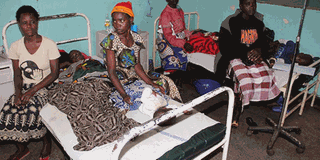Covid-19 disproportionately affects women and girls

Overstretched hospital: Women sharing beds with their children in public hospitals is a common feature across Africa. PHOTO | POOL | NATION MEDIA GROUP
What you need to know:
- Unintended pregnancies mean that girls will have to stay at home while the boys will not.
- Girls and young women are expected to be the primary caregivers of the elderly and their younger siblings.
With Covid-19 cases steadily on the rise since the first person tested positive in Kenya in mid-March, it seems clear that the pandemic will not disappear anytime soon.
Any vaccine will take a significant amount of time to come into effect, as it first must be developed, tested, retested, produced in mass and distributed. Most scientists believe this process will take at least a year. It is going to be a long wait.
And each day women and girls must stay at a home is likely to affect them disproportionately. We need to pay attention to how global pandemics affect one gender more than the other.
I am not referring to the physical and health repercussions, but the social impact.
According to Unesco, the Covid-19 pandemic has forced 743 million girls to stay home from school in 185 countries. In total, 1.54 billion children and youth in schools and universities are currently not receiving the education they need.
However, Unesco also predicted that girls are far less likely to return to school when the pandemic ends. That is a result of several causes.
First of all, unintended pregnancies mean that girls will stay at home. This has been worsened in recent months by limited access to contraceptives.
Domestic violence has increased all over the world as a result of more time spent at home. Cases of forced child marriages may also increase in counties like Kajiado.
And in places where child marriages are rampant and so is Female Genital Mutilation (FGM). Fortunately, this has been one of the main issues that the government is trying to eradicate. Speaking at the Women Deliver Conference in Vancouver in June of last year, President Uhuru Kenyatta committed to end FGM in Kenya by 2022and also to promote gender parity.
This commitment has seen more women appointed in leadership positions. Besides, women have been elected in parliament. The government has ensured that girls are kept in school.
By making it compulsory for parents to send all children to primary and secondary school, it opens many more opportunities for the girl child. It also prevents them from early marriages.
President Kenyatta said that while more women are being appointed to leadership roles in Kenya, progress is still slow, largely due to cultural opposition. For example, the National Assembly rejected an equality bill that stipulated that no more than two thirds of parliamentary seats should be occupied by men.
There is still a long way to go in terms of achieving gender equality in Kenya.
Having to stay at home 24/7 tends to increase the burden on girls and young women, since they are expected to be the primary caregivers of both the elderly and their younger siblings.
Besides, social norms dictate that girls must cook, clean, and make sure that the home runs smoothly.
This system is outdated and holds us back as a country. Some traditions are meant to be broken. If half of the country is being held back from reaching its full potential, then our economic development goals can certainly not be realised.
But we must acknowledge that certain inequalities exist, and that socially, women and girls are being disproportionately affected by the coronavirus pandemic.As part of our own family units, each of us has the responsibility to make our households a little more equal. And as part of the nation of Kenya, we bear a greater responsibility to support and develop a more equal society.
Ms Benyawa is a journalist. [email protected]





